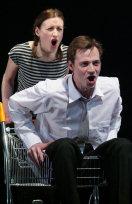Disco Pigs - Review
My liver remembers Cork (in the south of Ireland) only too well. It rebels every time I recollect a long weekend I spent there some years ago, and which has taken most of the intervening period to get over. Because Cork, or 'Pork City' as the characters in this play prefer to call it, is a city which certainly knows how to enjoy itself, largely based, at least in my experience, on copious quantities of alcohol being imbibed in the shortest possible time. No wonder then that this play frequently references alcohol, though that is incidental to the overall subject matter.
'Disco Pigs' is a two-hander featuring Ray Bullock Jnr as Pig, and Juliet Crawford as Runt. The two characters live next door to each other and were born just a few seconds apart. From infancy, they've struck up a unique relationship shunning the rest of the world, even though they're dependent on their mothers for food, as well as being addicted to TV, discos and getting their hands on as much cheap - or free - booze as they can. Their intense relationship has even led to them developing a kind of language, which seems to protect as well as exclude. But it's almost 'baby talk' that increasingly seems at odds with their dawning maturity. For Pig and Runt, things are changing, and not at equal or compatible rates, nor even in the same direction.
We first meet them as they relate the story of their birth when their respective mothers lay almost side-by-side in the delivery room. With Pig pushing Runt around in a supermarket shopping trolley, the opening scene sets the frantic and energetic pace for the rest of the play, during which we see them in pubs, an off-licence, a taxi, Pig's bedroom and, of course, the disco.
Pig and Runt live their lives in the ill-defined and confusing 'no man's land' between childhood and the adult world. They despise their parents, but are only too willing to be fed: "schlep it there" says Pig as his dinner arrives, and then greedily guzzles it down as if it might vaporise if not eaten immediately. And they both lick their cutlery clean in an almost fanfare-like, primeval gesture. More like children in a fantasy world, they've yet to come to terms with adult reality and all that that entails. But with hormones sloshing around their veins, things are stirring inside both of them. For Pig it's sexual awakening, but for Runt it's a sense of freedom and longing for 'something else' - a taste perhaps of what the rest of the world and other human beings have to offer.
Ray Bullock's Pig is a slender young man with an attractive boyishness that wouldn't seem adrift in a church choir or in the scouts. Good looking and athletic though he is, Bullock manages to convey a definite but subtle sense of oddity and not a little in the way of sheer menace. Almost from the moment we meet up with him, something seems out of place, and psychologically disturbing. Pig's world is defined by his bedroom - his 'kingdom' - and the disco where the 'pump, pump, pump' of the music seems to intoxicate him and motivate him to sudden and extreme violence even more than stolen alcohol.
Though Juliet Crawford's Runt seems almost identical to Pig at the start of the play - a kind of twin if you like - we soon realise there's something more wistful about her. Though Pig is 'pack leader', Runt is already out in front in terms of emotional development and is drawn to a world outside the 'Bonnie and Clyde' relationship with Pig. It's a conflict that can't be resolved without loss. And on their seventeenth birthday when Pig takes Runt to the seaside as a present, he's unwittingly sowing the seeds of the destruction of their relationship, because Runt is already moving on, growing up if you will - and it's obvious that her future doesn't include Pig. As she cries at the end of the play, it's as much for her own 'rebirth' as for the relationship she's about to leave behind.
Ray Bullock and Juliet Crawford both shine in this doomed, emotional, and ultimately sad, rollercoaster ride. However, I found Martin Jady's direction just a little too frenetic at the start when the audience needed time to adjust to both the accents as well as the distinctive language the characters employ. But it's a tough call since the play also needs to hit the ground running.
Written by Enda Walsh, 'Disco Pigs' has already received a clutch of awards from, among others, the Dublin Theatre and Edinburgh Festivals, and has also been turned into a film (directed by Kirsten Sheridan). Although Walsh's piece is innovative in its use of language - bordering on the poetic at times - I'm not sure that it tells us much in the way of anything new about adolescence. Still, the characterisations are interesting and well-defined, and though the violence prevents one from saying the piece is 'fun', there are many humorous moments, not least of which is when Pig describes Terry Wogan's TV programme as a 'top show' - hardly what we might expect 'The Bonnie and Clyde of Pork City' to watch!
(Peter Brown)
Originally published on
